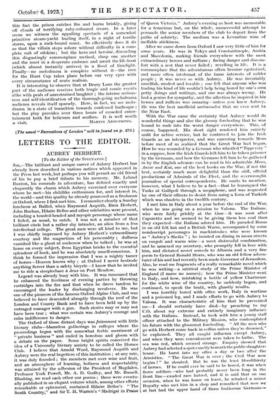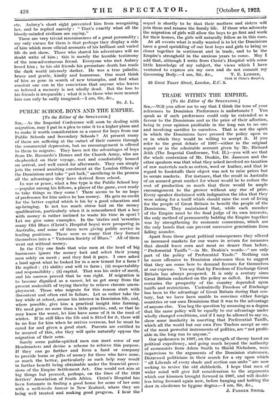LETTERS TO THE EDITOR.
AUBREY HERBERT.
[To the Editor of the SPECTATOR.] Sia,—The brilliant and unique career of Aubrey Herbert has already been described in various notices which appeared in the Press last week, but perhaps you will permit an old friend of his to pay a brief tribute to his memory. Mr. Leland Buxton, his comrade in adventure, has defined exactly and eloquently the charm which Aubrey exercised over everyone whom he met—his childlike enthusiasm for, and interest in, the world—and this quality he already possessed as a freshman at Oxford, where I first met him. I remember clearly a Sunday luncheon at Balliol, when Raymond Asquith, Bron Herbert, .John Buchan, Hilaire Belloc and other celebrities were present, including a tousled-headed and myopic personage whose name I failed, as usual, to catch. I was not a member of that brilliant circle but a rather shy intruder, an alien from a less intellectual college. The great men were all kind to me, but I was chiefly impressed by Aubrey Herbert's extraordinary courtesy and the magnetism of his personality ; dullness vanished like a ghost at cockcrow when he talked ; he was at home on every subject, from Egyptian bricks to the essential splendour of hock, and he was absolutely unself-conseious. I think he formed the impression that I was a mighty tamer of horses—Heaven knows why ; at Oxford I never bestrode anything fiercer than a safety bicycle—I know that he invited me to ride a steeplechase d deux on Port Meadow.
Legend was already busy with him. It was rumoured that he enhanced the liveliness of evening parties by throwing cartridges into the fire and that when he drove tandem he encouraged the leader by discharging revolvers. He was one of the pioneers of the famous Oxford Alpine Club, and was believed to have descended abruptly through the roof of the London and County Bank and to have been held up by the outraged manager with a gun. Such stories may or may not have been true ; what was certain was Aubrey's courage and calm indifference to danger.
The Oxford of those distant days was foisonnant with little literary clubs—blameless gatherings in colleges where the proceedings began with the somewhat feeble merriment of " private business " and ended in boredom and gloom with a debate on the paper. Some bright spirits conceived the idea of a University literary society to be called the Horace Club. I believe that Arnold Ward, Raymond Asquith and Aubrey were the real begetters of this institution ; at any rate, it was duly founded ; the members met over wine and fruit, and an atmosphere of learning, holiness and respectability was attained by the adhesion of the President of Magdalen, Professor York Powell, Mr. A. D. Godley, and Mr. Bussell. Blushing, we read each other our poems ; these were eventu- ally published in an elegant volume which, among other efforts remarkable or ephemeral, contained Hilaire Belloc's " The South Country," and Sir T. H. Warren's " Madrigal in Praise
of Queen Victoria." Aubrey's evening as host was memorable for a tenacious but, on the whole, unsuccessful attempt to persuade the senior members of the club to depart from the paths of sobriety. The medium was a Levantine wine of ineffable stickiness.
After we came down from Oxford I saw very little of him for some years. He was in Tokyo and Constantinople, Arabia and Macedonia, making friends everywhere with the most extraordinary heroes and ruffians ; facing danger and discom- fort with a zest that never failed ; revelling in life. It is a commonplace that the adventurous often become egotistical, and more often intolerant of the tame interests of milder people ; it was never so with Aubrey. He was invariably unselfish, modest and lovable ; one felt that anyone who was leading his kind of life couldn't help being bored by one's own petty doings and writings, and one was always wrong. He had a genius for sympathy, and the affection he inspired in his heroes and ruffians was amazing—unless you knew Aubrey. He was the best unofficial ambassador that we ever sent to the Near East.
With the War came the certainty that Aubrey would do wonderful things and also the gloomy foreboding that he was bound to rush into the worst danger everywhere. This, of course, happened. His short sight rendered him entirely unfit for active service, but he contrived to join the Irish Guards as an interpreter, and was careering towards Mons before most of us realized that the Great War had begun. How he was wounded by a German who whistled i` Tipperary " in a coppice, how the Irish Guards left him to be taken prisoner by the Germans, and how the Germans left him to be gathered in by the English advance can be read in his admirable Mons, Anzac and Kut, one of the best books on the War, if not the best, certainly much more delightful than the stiff, official productions of Admirals of the Fleet, and the overwrought journalese of special correspondents. He omits to mention, however, what I believe to be a fact—that he harangued the Turks at Gallipoli through a megaphone, and was requested by one of their officers to desist from using a form of Turkish which was obsolete in the twelfth century.
I met him in Italy about a year before the end of the War, when he was going on a mission to Valona. The Italians, who were fairly prickly at the time—it was soon after Caporetto and we seemed to be giving them less coal than they expected—the Italians adored him. He paraded Rome in an old felt hat and a British Warm, accompanied by sonic nondescript personages in mackintoshes who were known as " Aubrey's Sheiks " ; he insisted on dining in mean streets on vongole and warm wine—a most distressful combination,
and he annexed my secretary, who promptly fell in love with him, and dictated secret screeds to Albania and a very fine poem to General Ronald Storrs, who was an old fellow adven- turer of his and had recently been made Governor of Jerusalem.
Also, he read me fragments of a really remarkable novel which he was writing—a satirical study of the Prime Minister of England (I name no names); how the Prime Minister went to Italy, and how, mistaking a bottle of yellow Chartreuse for the white wine of the country, he suddenly began, and continued, to speak the truth, with ghastly results.
I was horribly bored with office work, Italy in wartime and a poisoned leg, and I made efforts to go with Aubrey to Valona. It was characteristic of him that he prevented me—I should certainly have died—by preaching to my C.O. about my extreme and entirely imaginary influence with the Italians. Instead, he took with him a young staff officer attached to the Military Mission, who contemplated his future with the gloomiest foreboding. " All the men who go with Herbert come back in coffins unless they're drowned," he explained. They all caught influenza except Aubrey, and when they were convalescent were taken to bathe. The sea was red, which seemed strange. Enquiry showed that Aubrey had selected a spot exactly beneath the public slaughter- house. He burst into my office a day or two after the Armistice. " The Great War is over ; the Civil War now begins I " he shouted. But he was the least bloodthirsty of heroes. If he could ever be said to be bored, it was when fierce soldiers—who had probably never been long in the front line—exuded race hatred, and it is said that on one occasion, when he was home on leave, he rebuked a minor Royalty who met him in a shop and remarked that now we at last had the upper hand of those loathsome Germans—. etc. Aubrey's short sight prevented him from recognizing her, and he replied suavely : " That's exactly what all the bloody-minded civilians are saying."
These are very trivial reminiscences of a great personality ; my only excuse for them is that perhaps they display a side of him which more official accounts of his brilliant and varied life do not show. Those who shared his adventures will no doubt write of him ; this is merely the humble testimony of the non-adventurous friend. Everyone who met Aubrey loved him ; to his old friends his premature death has made the dark world intensely darker. He was a true paladin, brave and gentle, kindly and humorous. One must think of him as gone in search of new triumphs, and find what comfort one can in the conviction that anyone who leaves so beloved a memory is not wholly dead. But the loss to his friends is irreparable ; what it is to those who were nearest him can only be sadly imagined.—I am, Sir, &e.,
ST. J. L.











































 Previous page
Previous page